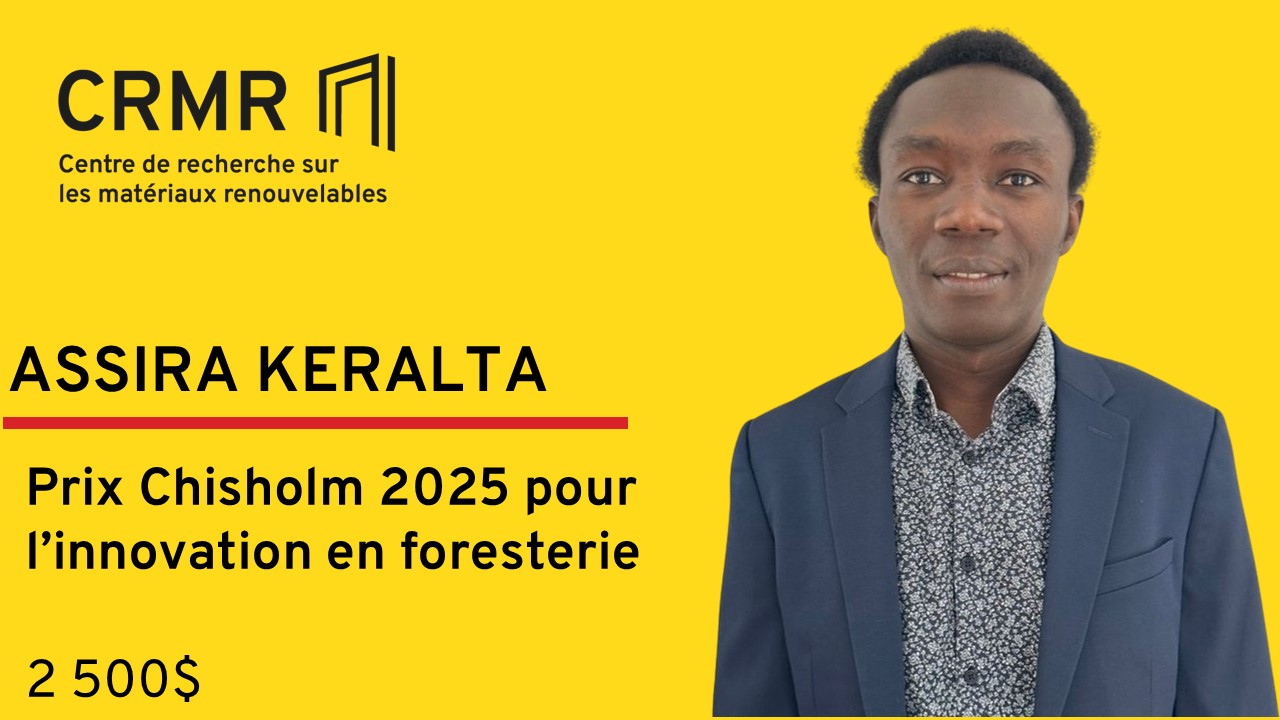The Chisholm Prize 2025 Awarded to Assira Keralta for His Work in Forestry Innovation!
Congratulations to Assira Keralta, who has been selected as one of the winners of the Chisholm Prize 2025 for Innovation in Forestry (CAD$2,500), a prestigious award presented by the Forest Products Association of Canada (FPAC).
This award highlights the excellence, creativity, and vision of young researchers whose work is advancing the Canadian forestry sector. It brings attention to innovative solutions emerging from scientific research to address the complex challenges related to climate change, sustainable resource management, and the bioeconomy.
The academic community and the forest research sector in Canada are filled with brilliant minds driven by a desire for transformation and innovation. In this context, Assira, a PhD candidate in Wood and Bio-based Engineering Materials, has distinguished himself through the exceptional quality of his research work. He is pursuing his project under the supervision of Véronic Landry and co-supervision of Julien Chamberland, in collaboration with Marie-Josée Dumont. His research aims to develop an innovative wood stabilization process using bio-based materials. Specifically, he is valorizing permeate from whey ultrafiltration, a by-product of the dairy industry, to improve the dimensional stability and durability of wood.
This project perfectly illustrates how interdisciplinary approaches based on the circular economy and the valorization of industrial co-products can contribute to the development of new bio-based materials while reducing the environmental footprint of the construction sector.
The selection process for the Chisholm Prize 2025 was highly competitive, with many outstanding applications from across the country. Assira stood out thanks to the originality of his project, the scientific rigor of his research, and the relevance of his work for the future of the Canadian forestry sector.
Congratulations to Assira for this inspiring achievement!

Project Title: Characterization of Reaction Products Between Whey Ultrafiltration Permeate (WUP), Bio-based Acids, and Products Formed During Heating of WUP
Abstract: This project aims to valorize dairy industry coproducts for wood modification to enhance the stability and durability of wood. By utilizing whey ultrafiltration permeate (WUFP), a waste product rich in lactose, the project seeks to develop an innovative, bio-based wood stabilization process that would be both environmentally and health-friendly. Wood is a sustainable resource with high carbon storage potential, making it a key material for decarbonization efforts. However, its hygroscopicity and biodegradability limit its applications, particularly in environments with significant climatic fluctuations. The ability of wood to absorb and release moisture leads to dimensional instability, and fungal degradation. Polyesterification has emerged as an effective chemical modification technique to address these limitations. This process involves impregnating wood with an alcohol and a carboxylic acid that react in situ to form a polymeric network, densifying the cell wall and reducing its moisture absorption capacity. Currently, sorbitol and glycerol are commonly used but remain costly. Meanwhile, the dairy industry generates vast amounts of WUFP, more than 500 million liters annually in Quebec alone. WUFP is rich in hydroxyl groups, similar to sorbitol and glycerol, making it an ideal candidate for polyesterification. This project leverages this waste stream to enhance wood stability while addressing an environmental challenge.

